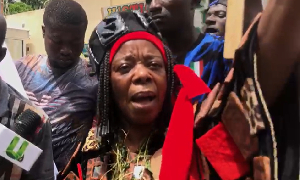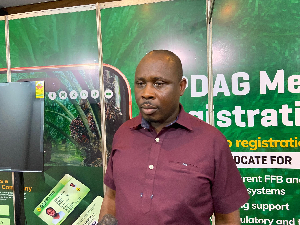A GNA feature by Belinda Ayamgha
Accra, Sept. 23, GNA, - Violence Against Children(VAC) has always been a problem in Ghana but has been brought to the fore recently by the scenes of abuse captured on video by Investigative Reporter, Anas Aremeyaw Anas.
This has alerted Ghanaians and many have become very anxious about treatment meted out to children in care institutions around the country. However, VAC is not limited to these institutions alone, but is a widespread problem in homes, schools, communities, workplaces and penal institutions. Most of these abuses remain hidden as victims do not report them due to the fear of further punishment and also because they are brought up to accept the abuses as "normal" forms of correction or punishment.
Statistics from the Domestic Violence and Victim Support Unit (DOVVSU) of the Ghana Police Service show that a total of 666 cases of VAC had been recorded at the Unit in the first half of 2010(spanning between January and June).
These included 206 defilement cases; eight rape; 31 indecent assault; 10 incest; 28 assault; exposing child to harm; eight child abandonment; three child theft; 206 failure to supply for a child and 128 cases of unlawful child removal.
It is important to note that these are just the ones that have been reported. Empirical evidence demonstrates that many more children, who are abused, do not report them and many more that are vulnerable to abuses are not protected from them.
It is also heartrending to note that most perpetrators of these crimes are people close to the victims - those they are supposed to trust; parents; teachers; family friends and neighbours. These people have now become the people children need to be protected from. The United Nations Children's Fund (UNICEF) describes Child Protection as "safeguarding a child's rights to survival, growth, and development by preventing and responding to violence, exploitation, and abuse. This also includes targeting children, who are uniquely vulnerable to these threats, such as those living without parental care or in situations of conflict."
The Government of Ghana has done quite a lot to ensure the protection of our children. As a follow up to the UNICEF Consultation Conference on Violence against Children held in May 2005 in Bamako, Mali, in which Ghana participated, a five-year action plan on VAC 2008-2012 has been put in place to deal with the problem. The five-year Action Plan was initiated by the Information Research and Advocacy Division (IRAD) in the Department of Children (DOC) of the Ministry of Women and Children's Affairs (MOWAC) and Child Protection Unit of UNICEF in 2005.The goal of the plan is to create a safe environment that protects children from all forms of violence wherever they occur - home; school; institutions; workplace and community. A draft of the Action Plan, GNA obtained from the Department Of Children stated that "Ghana has reformed its legislations extensively to cover areas that relate to violence against children. The passage of the Children's Act, 1998 (Act 650); The Criminal Offences Act, 1960 (Act 29) (Revised Edition); and the Juvenile Justice Act, 2003 (Act 653) are examples of the Government of Ghana's commitment to improve the legislative environment to reduce violence against children and other young people.
However, in spite of the legislative initiatives made to suppress violence against children many of them still face varying degrees of violence in Ghana. This is because change in legislation does not necessarily guarantee social and behavioural changes, especially in an instance where the changes are not backed by public and professional education."
Assistant Superintendent of Police (ASP) Alichewu Abdulai Amadu, a Prosecutor at DOVVSU in Accra, said the Unit had also embarked on sensitization campaigns to create awareness about violence against children and to encourage victims of abuse to report them. "We organize symposia and other sensitization strategies at schools, markets, churches and other institutions to create awareness" he said. He added that the programmes have so far been successful as awareness has increased and more reports have been made.
Madam Mariama Yayah, Acting Director of the Department of Children under the Ministry of Women And Children's Affairs (MOWAC), condemned violence against children in general and particularly the incidents at the Osu Children's Home saying "we are not happy about it and we will work hard on the Committee set up by the Minister of Employment and Social Welfare to investigate the allegations captured in the video footage".
She said children especially orphans and abandoned children must be given the best of care so that they could grow into responsible citizens of Ghana.
Madam Yayah said her Department was working to implement the policies of MOWAC on child survival in collaboration with other agencies responsible for the implementation of laws on child survival - Social Welfare Department; Ghana Education Service; DOVVSU; Commission on Human Rights and Administrative Justice (CHRAJ) among other institutions. The question that still remains to be answered though is whether these interventions are adequate protection for our children against this atrocious phenomenon of violence against children.
Although it is internationally recognized in human rights law that children have a right to protection from all forms of violence; including corporal punishment in all settings home; school; penal systems and alternative care; Ghana is yet to ban corporal punishment in all areas except as a form of punishment in penal institutions. No violence against children is justifiable thus Government, civil society, nongovernmental organizations (NGOs) and every Ghanaian must work together to ensure the safety of children in the country by banning all forms of corporal punishment especially against children and to find ways of rehabilitating victims of violence so that they can grow to become useful citizens but not bitter, vengeful and violent adults.
Opinions of Thursday, 23 September 2010
Columnist: GNA














